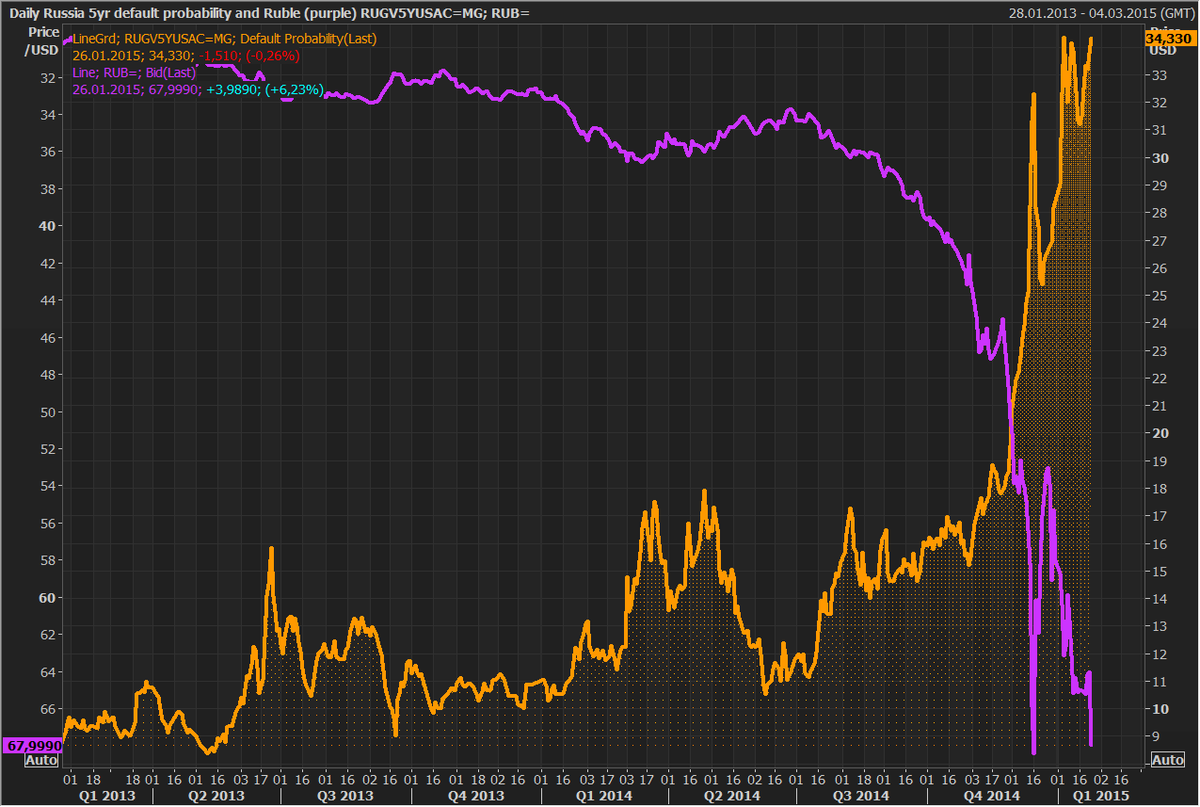This
was completely unsurprising. As I have said previously, these credit
downgrades are political not economic in the rationale behind them.
They do come at a cost of perhaps $20-30 billion in earlier
repayments, but there it is. Russia needs to hurry up and sort out
its own financial markets and work with the Chinese to create its own
credit rating agencies. Borrowing excessively in the capital markets
and using the credit rating agencies of countries politically hostile
to Russia is a bad idea, as we can now see.
What
is particularly ironic about this decision is that it has come on the
same day as confirmation that industrial production in Russia rose by
substantially more in the supposed crisis month of December than
anyone had expected. See Jon Hellevig's and Elliott's Auckland's
pages for more details.
---Alexander
Mercouris
S&P
downgrades Russia's credit rating to junk
US-based credit rating agency Standard & Poor’s has cut Russia’s sovereign rating to BBB-, leaving it below investment grade for the first time in a decade. Moscow termed the decision "overly pessimistic."
RT,
26
January, 2015
“The
downgrade reflects our view that Russia's monetary policy flexibility
has become more limited and its economic growth prospects have
weakened. We also see a heightened risk that external and fiscal
buffers will deteriorate due to rising external pressures and
increased government support to the economy,” said
a statement from the agency.
The
ruble fell from 66.3 to over 69 per dollar. As it experienced
downward pressure through the early hours of Monday, the Russian
currency has now fallen by over 8 percent since the previous trading
day.
Russia's
Finance minister said S & P's move was "overly pessimistic,
and did not take into account the strengths of the Russian economy."
Among its advantages he listed Russia's considerable foreign currency
reserves, a positive balance of payments, and low levels of state
debt. The official urged investors to "avoid dramatizing the
situation."
In
contrast, in their breakdown, S&P analysts drew up a bleak future
for Russia’s economy, which is predicted to shrink this year.
“We
project that the economy will expand by about 0.5% annually in
2015-2018, below the 2.4% of the previous four years,” says
the report.
It
blames both the "structural
problems" of
Russia’s economy, and the cycle of Western sanctions and
counter-sanctions imposed since the succession of Crimea from Ukraine
last March.
“We
see this muted projected growth partly as a legacy of a secular
economic slowdown that had already begun before the recent
developments in the Ukraine. It also reflects a lack of external
financing due to the introduction of economic sanctions and the sharp
decline in oil prices.”
The
fall in credit ratings makes it more difficult for Russia to borrow
money on the international markets, and may have wider ramifications
for its financial system. Russian companies, both state-owned and
otherwise, may struggle to repay their loans, while many investors
without a remit to speculate in risky conditions may withdraw from
the Moscow stock markets.
The
government may have to step in to rescue key national corporations.
The Russian Central Bank has promised to inject 1.2 trillion rubles
(US$18 billion) into the country’s banking system to steer away
from a full-fledged crisis.
“Credit
ratings are meaningless in a situation when the international capital
markets are closed off to Russian companies,” said a statement from
oil and gas giant Rosneft, one of the companies targeted by sectoral
sanctions adopted against Russia in the summer over the escalation of
the conflict in Ukraine. Majority state-owned Rosneft insisted it was
feeling “confident.”
Russia’s
Central Bank announced last week that in its internal assessments it
would ignore any ratings issued by the Big Three Western ratings
agencies – Standard & Poor’s, Fitch, and Moody’s – that
were issued after March 2014.
It
said that all credit ratings given to Russian companies and banks
will now be at the discretion of the board of directors of the bank.
The regulator will assess whether or not the ratings made after March
are accurate. The decision came after Fitch and Moody’s had
downgraded Russia's sovereign debt to just above junk status.
Moscow
and Beijing announced their intention to create a rival rating agency
to S&P’s, Moody’s, and Fitch later this year. The two
countries are already partnered through the Universal Credit Ratings
Group (UCRG), which was set up in Hong Kong in 2013 and already
encompasses the most respected agencies from both countries, as well
as the US-founded Egan-Jones Ratings Company. The new agency may be
an expanded version of UCRG, which is still predominantly used by
internal Chinese investors.
Russia’s
foreign currency reserves stand at a respectable $380 billion – the
sixth biggest in the world - and sufficient to finance any immediate
obligations. But the Russian Central Bank has been forced to burn the
money keeping the ruble afloat, and budget shortfalls due to oil
prices may also have to be covered from the coffers.





No comments:
Post a Comment
Note: only a member of this blog may post a comment.